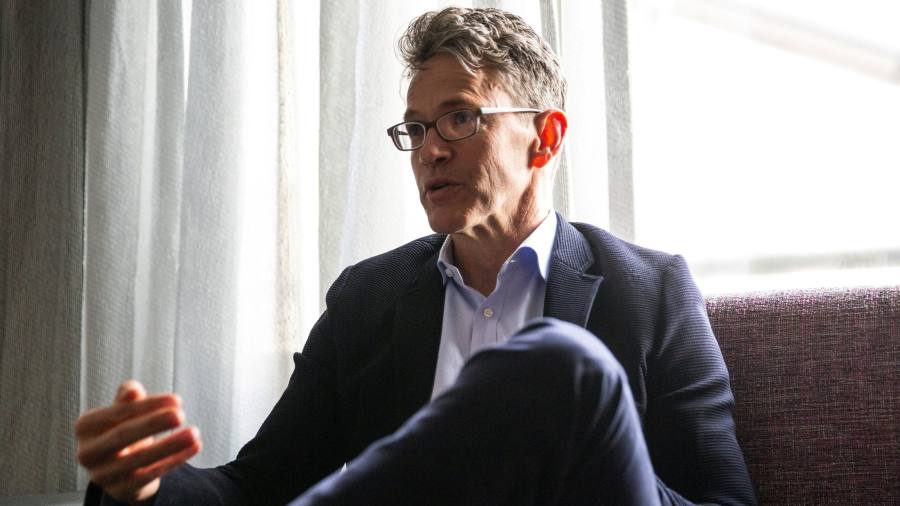Bayer AG’s new chief executive, Bill Anderson, is preparing for a sweeping blow to internal bureaucracy aimed at giving scientists and operations managers more leverage in making the 159-year-old aspirin-to-glyphosate conglomerate more innovative and efficient. say.
Anderson joined Bayer in April and officially became CEO this month. His appointment comes under pressure from shareholders who have been calling for the group to be broken up in an effort to contain lingering fallout from its $63 billion acquisition of U.S. crop group Monsanto in 2016.
A few days after he joined, Anderson said he would consider all options. Two weeks into his tenure as chief executive, the former head of Roche’s pharmaceuticals unit and former chief executive of U.S. biotech group Genentech, declined to elaborate on potential structural changes to the bullish group. “I don’t want to tell you more than I know,” he told the Financial Times.
Instead, at the company’s headquarters in Leverkusen, in northwestern Germany, he laid out plans to empower employees with “a radically different way of doing our work, allocating resources, setting budgets.”
Anderson said he wanted “everyone at Bayer to have the clout, the sense of accomplishment and the fulfillment of a sole proprietorship” without having to deal with any internal red tape.
To achieve this, he wants to cut internal bureaucracy and put more responsibility on individual employees. It’s not a layoff, he added, but a better way to organize work.
With 101,000 employees and revenues of EUR 50.7 billion, Bayer is one of Europe’s largest corporate giants, with 354 consolidated companies in 83 countries. They make prescription drugs to fight cancer, heart disease and other ailments, over-the-counter health products like Bepanthen cream, and seeds and herbicides for farmers.
The company has struggled with the multibillion-dollar debt it took on Monsanto and the mounting costs of lawsuits surrounding the crop company’s weed killer glyphosate. Bayer shares are trading at about 52 euros, half of what they were in 2016 before rumors of the deal began to circulate, while German stocks as a whole are up by a quarter.
Anderson wants managers to overcome the traditional top-down approach and let teams develop their own lives.
He likes to compare the situation of senior executives to the astronauts in Stanley Kubrick’s 2001: A Space Odyssey. In a sci-fi movie, the scientists on the spaceship gradually discover that the computer has taken over.
In his first meeting with the Bayer manager, Anderson played a clip from the film. His message was that “astronauts are us and we no longer have control”, but at the same time, the system is “often fundamentally flawed”.
He noted that surveys often show that employees at large companies say they are only performing at 30% to 50% of their potential due to cumbersome rules and decision-making processes.
“In big companies — and Bayer isn’t unique in this regard — decisions are often not made by people who are close to the decisions you want,” Anderson said, adding, “The world is pretty much just content with that. , but . . . it’s not very good.
He also wants to “cut budgets” by using company resources responsibly to help scientists and team leaders “drive medical innovation, inspire customers and get the most out of company resources.”
Successfully implemented under Genentech’s leadership, this freed up the months-long budget allocation process and freed up funds for innovation. “I’ve seen it before. Basically, once it starts, it’s an unstoppable force.“
Spending “actually went down” in the first year after Genentech scrapped the budget, he said, arguing that the bad incentive to spend unnecessary resources at the end of the year to secure next year’s budget has been removed. At Roche, it frees up about $3 billion a year for innovation.
Anderson opposed the idea of scrapping traditional budgets to create “free for all,” noting that the approval process was already in place. Employees can be held accountable by justifying their spending and resource needs in front of other team leaders.
“You’d have a completely different conversation because they’re all the same age and they all know,” When colleagues start exaggerating their accomplishments or needs, he says. “You can fool your boss, but you can’t fool your colleagues,” he said, adding that senior executives often allocate budgets based on “subjective factors, such as that person’s ability to convince them.”
Genentech’s current CEO, Alexander Hardy, who worked with Anderson at the biotech group, describes him as “a groundbreaking visionary and tenacious problem solver.”
Anderson’s core idea is that “decisions are made by the people who are most suitable for making decisions, not by the boss.”
He emphasized that there is no single “magic bullet” but that change requires “experimentation” and the input of many different employees. “I’m not going to come here and tell everyone they’re going to do it. We’re going to do things differently, but it’s not going to be ‘The Bill Show.'”


